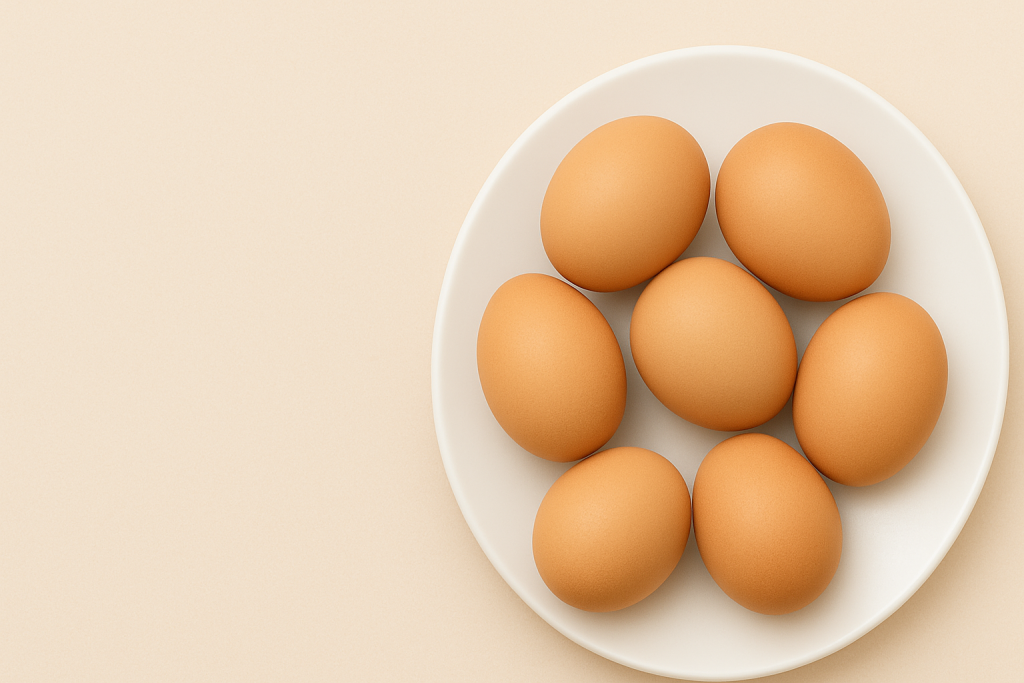🥚 How to Know If You’re Eating Too Many Eggs – And What to Do About It
Eggs have been at the center of nutritional debates for decades. Some say they’re a superfood; others warn about cholesterol. If you’re someone who enjoys eggs daily — or even several times a day — you might wonder: Am I eating too many? Is it bad for my health?
This guide will help you understand the science behind egg consumption, recognize the warning signs of overconsumption, and learn how to enjoy eggs safely and responsibly.
🟢 Why Eggs Are Good for You (Up to a Point)
Let’s start with the positives. Eggs are often called nature’s multivitamin for good reason. Here’s why they’ve earned that title:
✅ Nutrient Powerhouse
A single large egg contains:
-
6 grams of high-quality protein
-
Vitamin D – supports bone health and immunity
-
Vitamin B12 – essential for brain and nerve function
-
Selenium – powerful antioxidant
-
Choline – crucial for brain development, especially in pregnancy
✅ Supports Weight Control
Eggs help you feel full thanks to their protein content. Several studies show that eating eggs for breakfast can reduce calorie intake throughout the day — great news for those trying to manage their weight.
✅ Budget-Friendly & Versatile
Eggs are affordable and can be prepared in countless ways — from omelets to salads to baking. They fit into almost any diet, including keto, paleo, and low-carb plans.
But despite these benefits, it’s still possible to have too much of a good thing.
🔴 Signs You Might Be Eating Too Many Eggs
So, what happens when you overdo it? Here are five signs that might mean it’s time to cut back:
1. 🧪 Rising Cholesterol Levels
Each egg yolk contains about 186 mg of cholesterol — more than half the daily recommended limit for people at risk of heart disease. While modern research suggests dietary cholesterol doesn’t impact blood cholesterol as much as once thought, some individuals are more sensitive.
Watch out: If blood tests show rising LDL (“bad” cholesterol), and you eat 3+ eggs a day, eggs might be contributing.
2. 😣 Digestive Discomfort
Too many eggs can lead to:
-
Constipation (especially if you’re low on fiber)
-
Gas or bloating
-
Stomach heaviness, especially if fried in oil or butter
If you feel sluggish after breakfast, the eggs might be part of the issue.
3. 🔁 Repetitive Diet = Missing Nutrients
Relying too much on eggs could mean you’re missing out on other important food groups:
-
Fiber-rich foods like vegetables, beans, or fruits
-
Healthy plant-based fats from nuts or seeds
-
Iron and zinc from red meats or legumes
4. 🍳 Eating Eggs More Than 2–3 Times a Day
If you’re eating eggs at every meal, you’re likely consuming 4–6 eggs a day. That might be too much for most people in the long run, especially without balance.
5. 🤒 Allergic or Intolerant Reactions
Some people develop mild egg sensitivity over time, including:
-
Skin rashes
-
Mild nausea
-
Headaches
While rare, these could signal your body isn’t handling eggs well anymore.
📊 How Many Eggs Is Too Many?
There’s no one-size-fits-all rule, but here’s a helpful guide based on current nutrition research:
| Person Type | Recommended Limit |
|---|---|
| Healthy adult with no conditions | 1–2 whole eggs per day |
| With high cholesterol or heart risks | 3–4 whole eggs per week (talk to doctor) |
| Fitness enthusiasts (low-fat diet) | Up to 3 eggs/day or more with mostly whites |
| Children | 1 egg/day is generally safe |
| Elderly (with healthy liver function) | 1–2 eggs/day can be beneficial |
👉 Note: Egg whites contain almost no cholesterol, so you can eat more of them safely.
🧠 How to Balance Egg Intake Wisely
Here’s how to keep enjoying your favorite eggs without overdoing it:
🍽️ 1. Mix Whole Eggs with Egg Whites
Try using 1 whole egg + 2 egg whites for omelets or scrambled eggs. You get the flavor and nutrients of the yolk with less cholesterol.
🥗 2. Pair with Vegetables, Not Bacon
Instead of pairing eggs with sausage or bacon, try:
-
Spinach
-
Tomatoes
-
Mushrooms
-
Avocados
-
Whole grain toast
This boosts fiber and adds antioxidants.
🔄 3. Rotate with Other Protein Sources
Some days, swap eggs with:
-
Greek yogurt
-
Cottage cheese
-
Tofu or tempeh
-
Beans and lentils
-
Fish like salmon or tuna
Variety keeps your meals interesting and balanced.
🥄 4. Use Healthier Cooking Methods
Skip the deep frying. Instead:
-
Boil
-
Steam
-
Poach
-
Use olive oil spray instead of butter
🧭 Final Thoughts
Eggs are not the enemy. In fact, for most people, they’re incredibly good for you. But like anything, they can become a problem if they dominate your diet or replace other essential nutrients.
So, how do you know if you’re eating too many eggs?
👉 Listen to your body.
👉 Check your bloodwork regularly.
👉 Maintain a balanced, colorful plate.
If you’re doing all that — you can crack open that egg with confidence.
📌 TL;DR (Too Long; Didn’t Read)
-
Eggs are healthy, but eating more than 2 per day regularly may affect cholesterol and digestive health.
-
Look for signs like bloating, high LDL, or lack of dietary variety.
-
Use moderation and balance with other protein and veggie sources.


